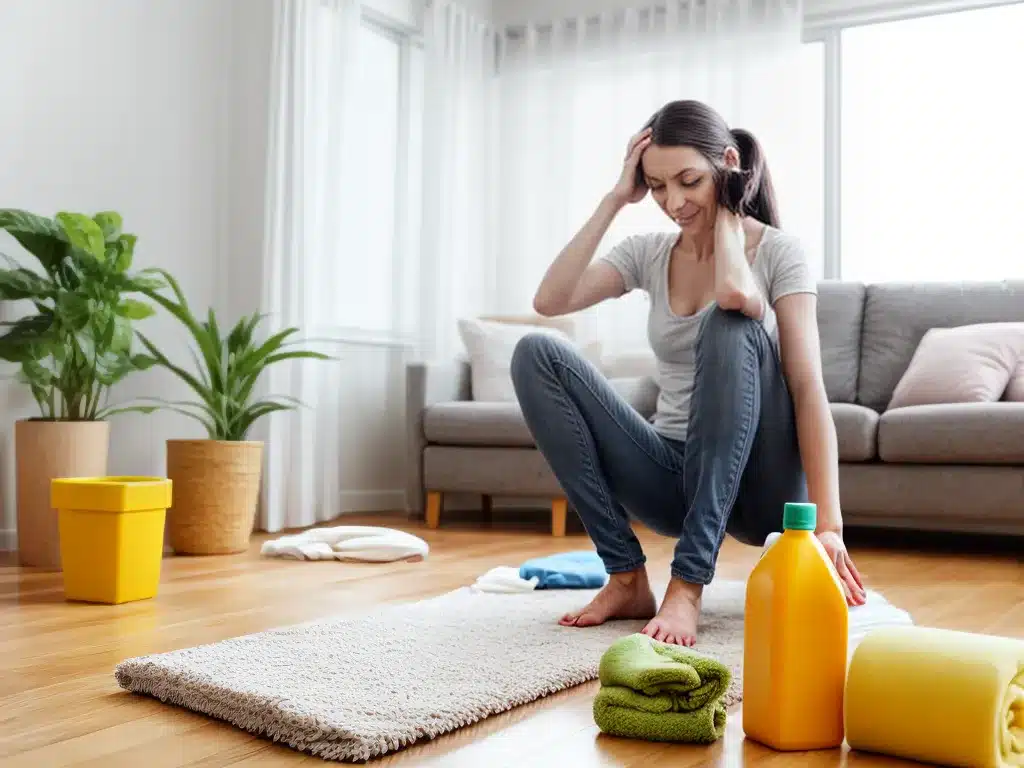Introduction
Having a clean and tidy home environment can have a profoundly positive effect on mental health and overall wellbeing. Research has consistently shown strong links between cluttered, messy living spaces and increased stress, anxiety, and depression. Conversely, maintaining a clean home supports feelings of calm, organization, and control over your surroundings.
In this article, I will explore the science behind the mental boost gained from keeping your home clean and clutter-free. I’ll also provide actionable tips and strategies to help you implement a manageable cleaning routine to promote mental clarity and enhance your daily life.
The Science Behind a Clean Home’s Impact on Mental Health
A growing body of research has demonstrated clear connections between clutter, mess, and disorganization in the home and negative mental health outcomes. Here’s an overview of some of the key scientific findings:
Clutter Raises Stress and Anxiety Levels
- Several studies have found that clutter leads to increased levels of the stress hormone cortisol. Elevated cortisol can contribute to anxiety, depression, and other mental health issues.
- Disorganization and lack of cleanliness in the home environment have been linked to ongoing feelings of stress and being overwhelmed.
- Clutter competes for our attention and can make us feel like our home is chaotic and out of control. This can negatively impact mood and wellbeing.
Mess Reduces Focus and Mental Clarity
- Visual distractions like piles of clutter make it harder to focus our attention. This can impair cognitive function and mental performance.
- Messy and disorganized homes require our brains to work harder when searching for items. This drains mental energy that could be put to better use.
Cleanliness Promotes Relaxation and Restoration
- Tidying and cleaning routines have been associated with lowered heart rate and blood pressure, signaling relaxation.
- Well-organized, uncluttered, and hygienic spaces support mental restoration and healthy sleep.
- The sense of accomplishment gained from cleaning can also boost mood.
Developing a Manageable Cleaning Routine
Maintaining cleanliness and organization in your living environment delivers proven mental health benefits. But for many of us, keeping a tidy home can feel overwhelming. Here are some tips for establishing a reasonable cleaning routine that fits into your lifestyle:
Set Manageable Daily and Weekly Goals
- Make your bed, do the dishes, and pick up clutter each day.
- Tackle heavier tasks like vacuuming, mopping floors, and cleaning bathrooms 1-2 times per week.
- Start small – even 5 minutes per day can make a difference over time.
Categorize and Contain Your Possessions
- Store items you use regularly in easy-to-reach areas.
- Contain clutter in baskets, shelves, and storage units.
- Minimize possessions you rarely use to reduce visual clutter.
Incorporate Cleaning Into Your Routine
- Clean for a few minutes while dinner is cooking or during TV commercial breaks.
- Team up with family members and assign tasks.
- Put on music or a podcast to make cleaning more enjoyable.
Use Tools That Simplify Chores
- Invest in a robot vac, dishwasher, washing machine, or other laborsaving appliances.
- Purchase cleaning products that reduce scrubbing and elbow grease.
- Use checklists and reminders to stay on top of cleaning tasks.
The Mental Health Payoff of a Clean and Organized Home
Making concerted efforts to keep your living space tidy offers a wealth of benefits for mental health and quality of life. Here’s an overview of the wellness boost you can gain:
-
Decreased stress and anxiety – Removing clutter alleviates feelings of chaos and being overwhelmed.
-
Improved concentration – Cleaner spaces allow our brains to focus without distraction.
-
Enhanced mood – Accomplishing cleaning tasks releases feel-good endorphins.
-
More restful sleep – Neat, hygienic bedrooms set the stage for deep, restorative sleep.
-
Increased productivity – Tidiness and organization helps us utilize our time and mental energy more efficiently.
-
Greater relaxation – Uncluttered homes support kicking back and unwinding without distraction.
-
Confidence and self-esteem – Maintaining a put-together home can give our confidence and self-image a boost.
Conclusion
Implementing habits to keep your living environment clean, clutter-free, and calm delivers measurable benefits for mental health and wellbeing. The science clearly demonstrates that messy, disorganized spaces contribute to stress, anxiety, poor focus, and exhaustion. Conversely, cleanliness promotes relaxation, clarity, feelings of control, and restored mental energy. Start small, be consistent, and appreciate the positive impact a tidy home can have on your state of mind.







